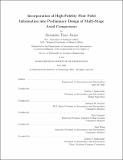Incorporation of High-Fidelity Flow Field Information into Preliminary Design of Multi-Stage Axial Compressors
Author(s)
Jörger, Alexander Timo
DownloadThesis PDF (5.128Mb)
Advisor
Spakovszky, Zoltán S.
Terms of use
Metadata
Show full item recordAbstract
This thesis establishes an axisymmetric methodology that incorporates pre-performed high-fidelity CFD into the performance estimation of multi-stage axial compressors during preliminary design. Its key differentiator is that radial non-uniformity, inferred from three-dimensional CFD and represented using orthonormal basis functions, replaces empirical correlations of blockage, loss, and deviation as well as simplified models of flow features, such as boundary-layer growth, spanwise mixing, and endwall-corner separation. The methodology includes the effects of changes in radial non-uniformity and in blade geometry on the axisymmetric flow field. The approach can supersede current throughflow methods, increasing the fidelity of preliminary design.
The primary impact of the methodology is a new capability for power gas turbine compressors to rapidly assess off-design matching at different spanwise locations along the blade height, enabling early-design choices, such as the annulus-area scheduling, based on the fidelity of CFD. Over a range of off-design conditions from near stall to near choke, the massflow capacity of a four-stage compressor was estimated within 1.2% and its efficiency within 1.5 percentage points compared to CFD at equal loading. The estimation of quasi-one-dimensional performance and the characterization of the flow close to the endwalls are improved relative to estimations of a legacy streamline curvature method since radial non-uniformity is inferred from high-fidelity flow field information. The methodology is demonstrated to be suitable for incorporation into compressor design systems.
Date issued
2021-06Department
Massachusetts Institute of Technology. Department of Aeronautics and AstronauticsPublisher
Massachusetts Institute of Technology